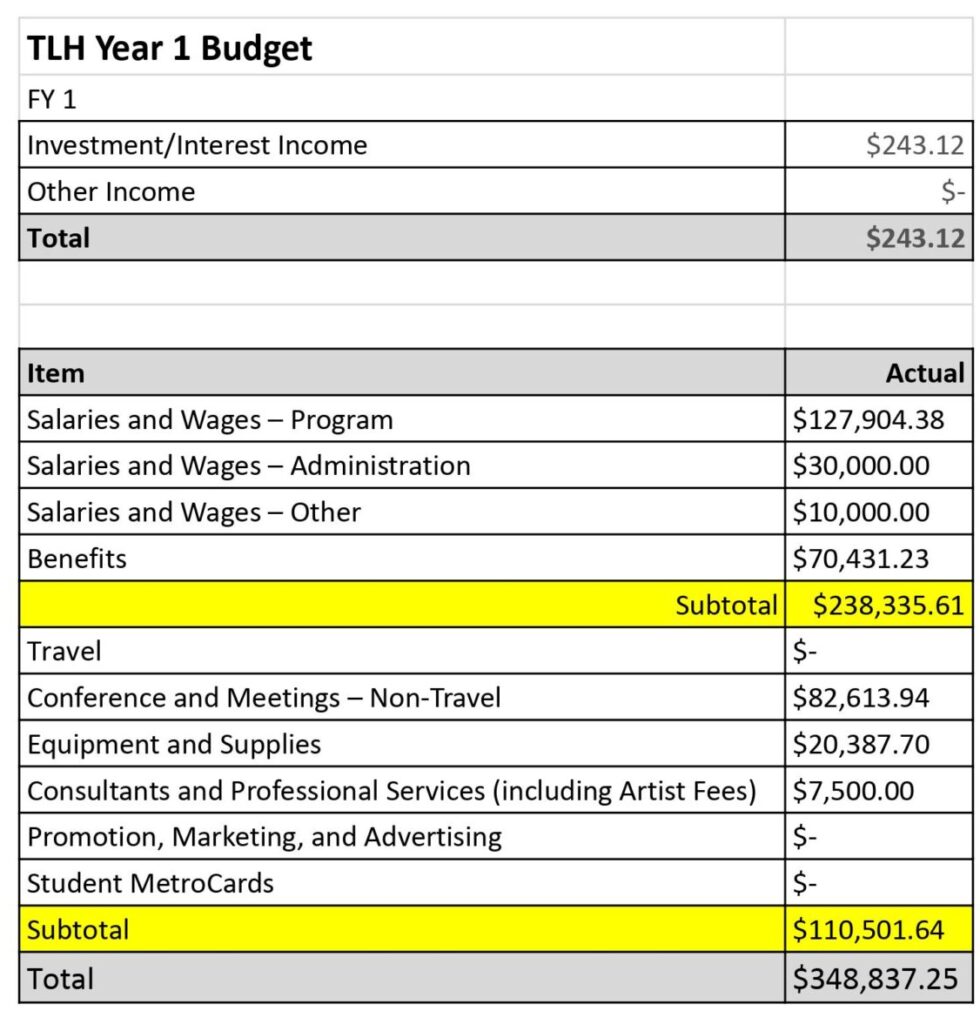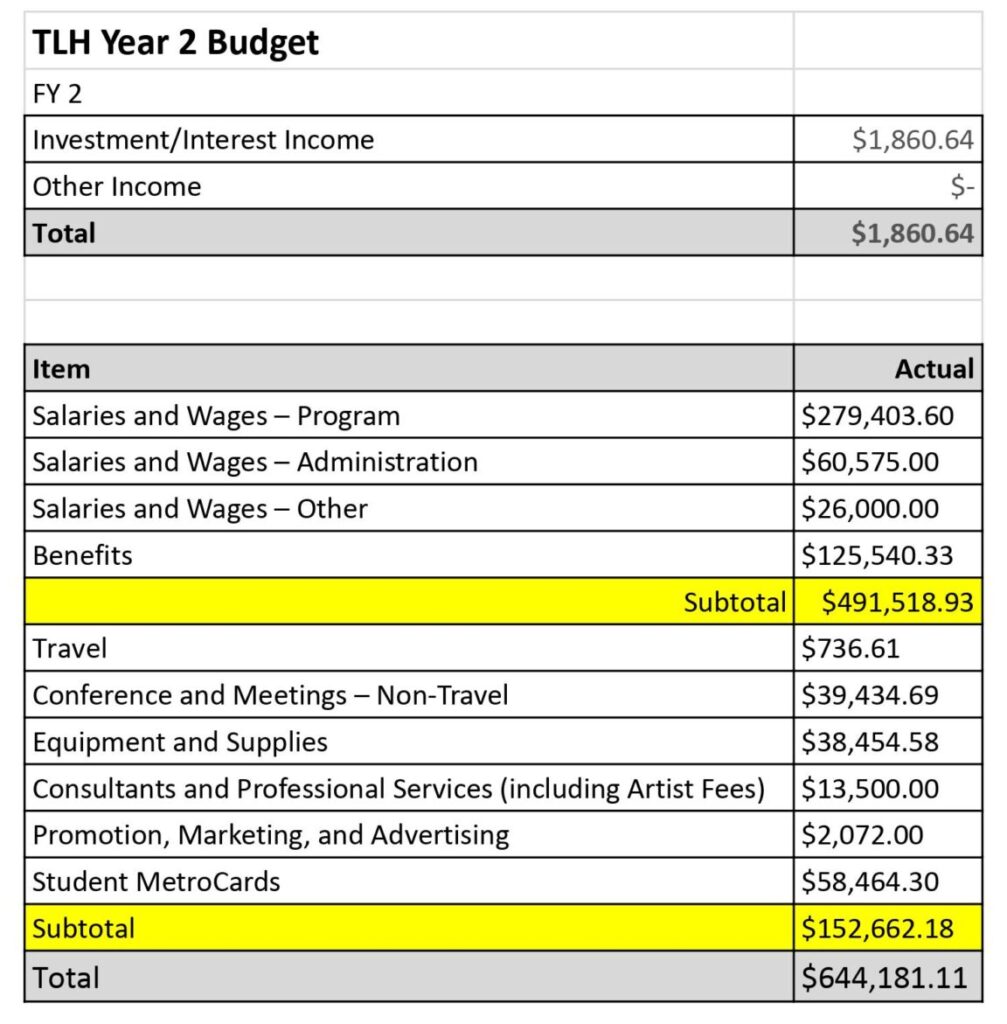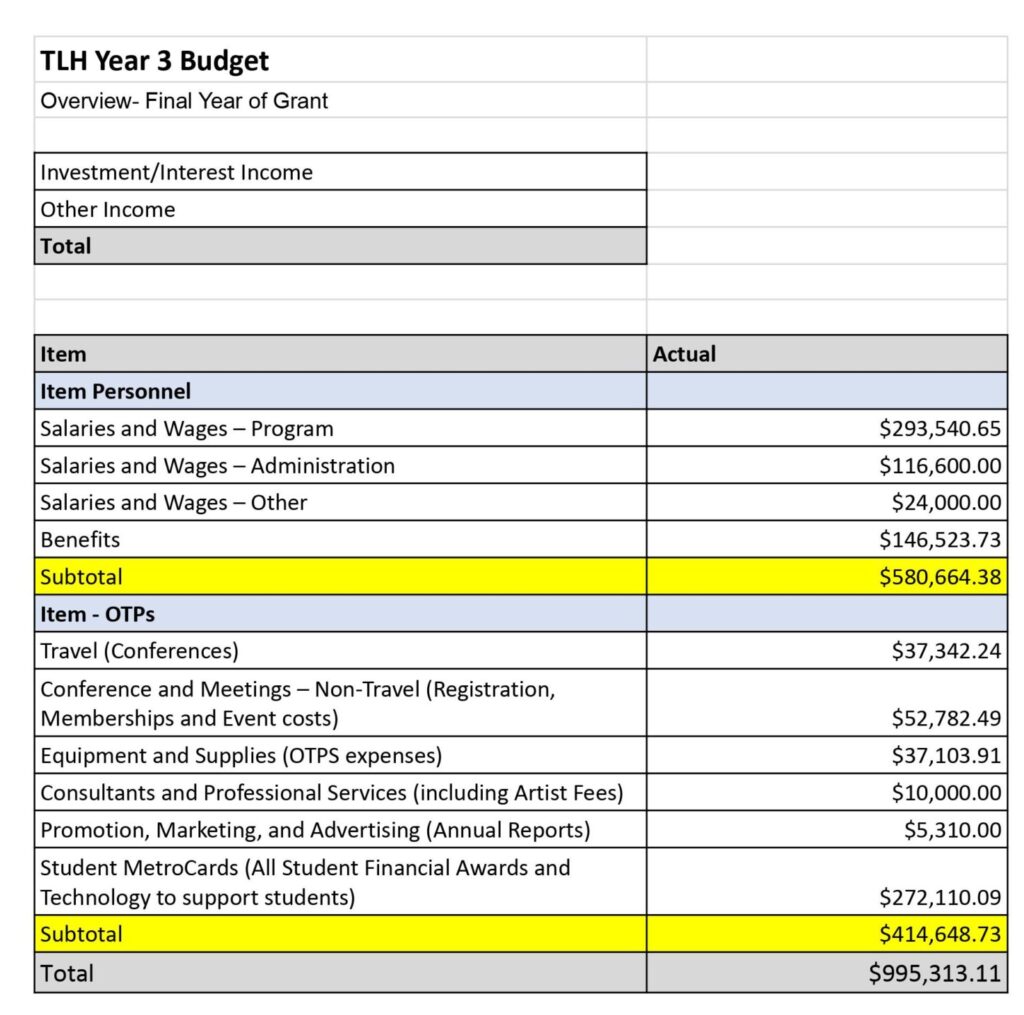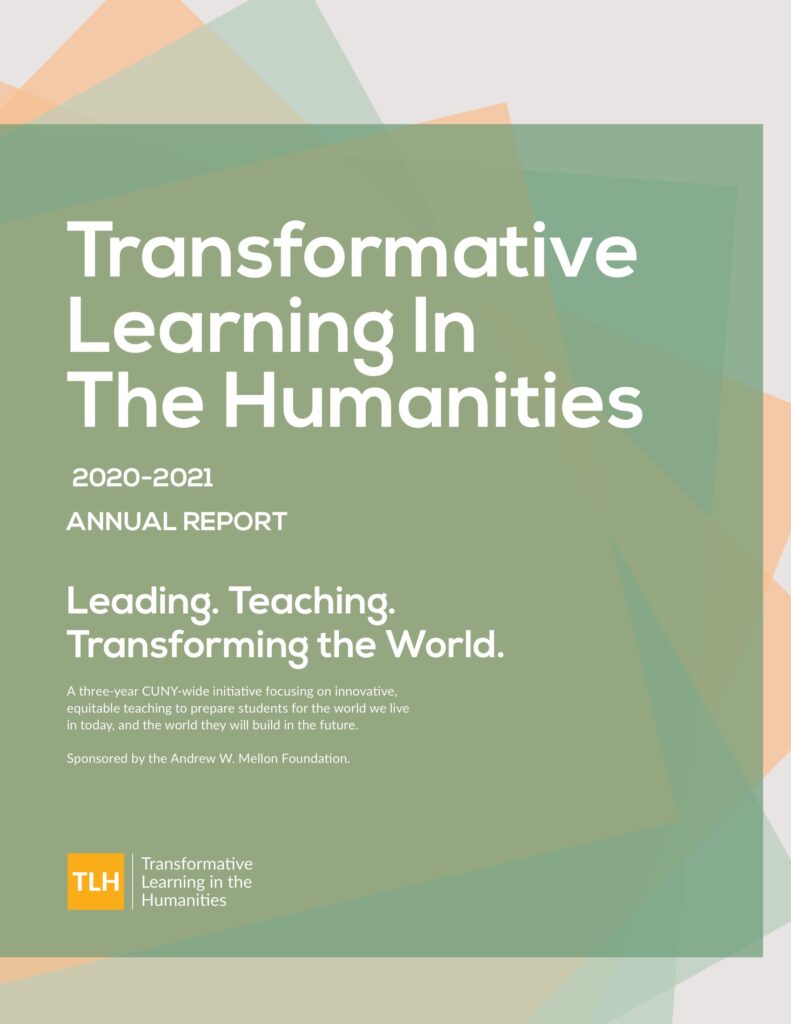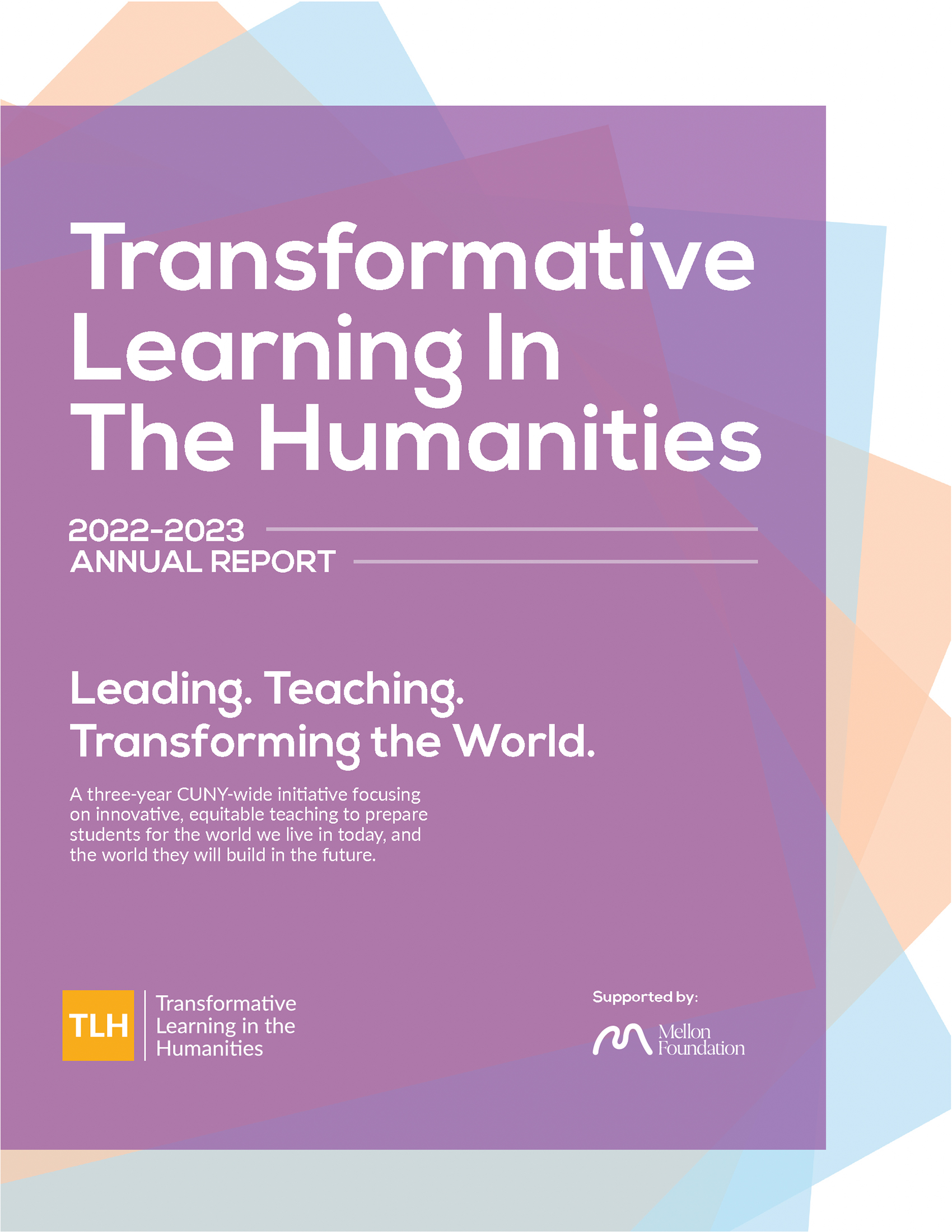When the TLH grant period began in 2020, we immediately adapted to the new modality that had shifted the present and future of teaching. We hired an agile team that built an engaged, impactful program using both remote and in-person tools and technologies. Below you will find resources that showcase our growing organization—what TLH looked like in its first, second, and third years of the grant—and how we went about selecting fellows and a student advisory board; carrying out the grant and working with faculty and students; hiring staff and running democratic meetings; grant reporting; and assessing our program.

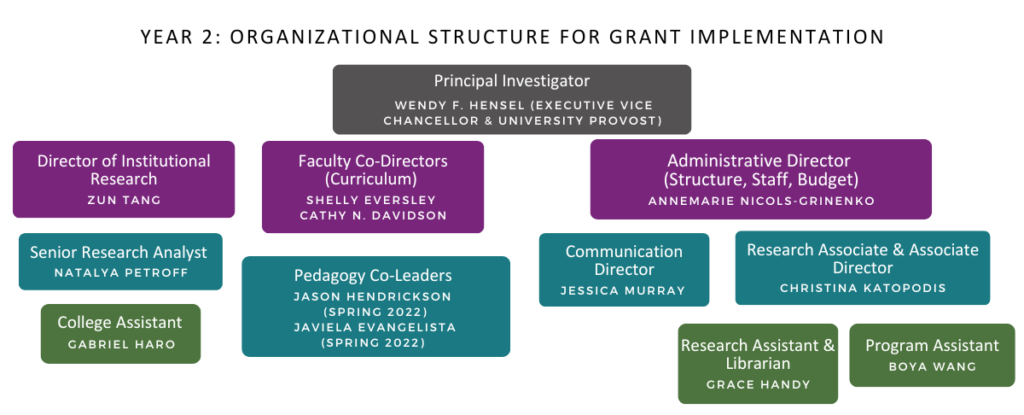
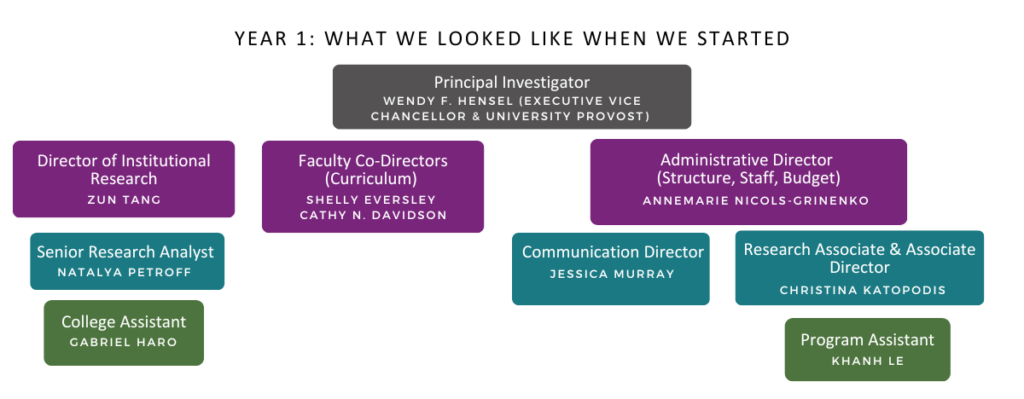

At the start of the TLH grant period, the Faculty Co-Directors and Administrative Director selected an Executive Director (Research Associate) who drafted a comprehensive strategic plan that included an internal program assessment plan and a plan for spending the program budget. TLH then hired three College Assistants: a Budget Officer; Program Assessment Staff Person; and a Director of Digital Communications. In its second year, we added a Research Assistant to our staff to help carry out administrative and research responsibilities relevant to the grant. In its third year, TLH hired two new College Assistants to carry out special projects: a Student Summit Coordinator and a TLH in a Box Coordinator.
Hiring
Below are some common questions we asked candidates for these roles and some common criteria we used to determine who was the best fit.
To make the interview experience as seamless, supportive, and welcoming as possible, we sent interview questions to the candidates in advance and encouraged them to think about and prepare answers to our questions.
- Please tell us about your prior experiences working in office settings, any similar work you’ve done at CUNY or outside CUNY in an administrative office. (You might offer a very brief summary, no more than 1-2 minutes, expanding on anything you’d like to highlight from your resume.)
- How do you approach learning something new?
- How do you approach managing multiple, ongoing projects, and stay organized?
- What controls do you put in place to check your work?
- What do you do when you encounter an error or problem?
- Please tell us about your experiences leading a project (something you’ve organized from scratch) and working with diverse and inclusive teams (thinking of diversity of all kinds; e.g., neurodiverse, etc.)
- Part of TLH’s mission includes promoting equitable, student-centered teaching designed for the rich diversity of CUNY students, and greater recognition for the importance of teaching. How do your interests align with TLH’s mission?
- How do you approach sharing your work with others, collaborating with others?
- What do you do when you encounter a roadblock in communication and/or collaboration?
- How might this role help you in your future career?
Staff Roles and Job Descriptions
Each of our six TLH staff members has written their own description of their job and duties below. Under each description is a link to download the original job description for the role, so you can see what the call for applications looked like and get a sense of how each person shaped their role once they were on the job.
Administrative Director
The Administrative Director of TLH is responsible for the overall administration of the program, excluding program curriculum.
Duties include:
- Serving as co-author of the Mellon Foundation grant proposal that funded TLH
- Communicating with Mellon Foundation about TLH
- Serving as co-author on all reports to the Mellon Foundation
- Communicating with CUNY system leaders about TLH
- Oversight and design of the structural aspects of TLH
- Hiring of staff for TLH
- Oversight and final approval for TLH’s budget
- Supervision and mentorship of TLH’s Research Associate and Associate Director and Communications Director
Communication Director
The communication director is responsible for creating and publishing public-facing communications about the program. Their main duties include keeping information up to date on websites, social media, and mailing lists, creating graphics or working with a graphic designer on marketing campaigns, and being a point of contact for program administrators and fellows who need help publicizing events and opportunities. They are also responsible for creating lines of communications for faculty fellows collaborating in cohorts and working groups, and surveying faculty fellows about relevant work during and after their fellowships.
Under supervision of the Executive Director, the Communication Director works to ensure that the activities of the program are communicated in an accessible way, consistent with brand guidelines of the program and the university.
Duties include:
- Publishing program information, including faculty photos and biographies, opportunities, events, news, publications, and other resources on the program’s websites
- Creating social media campaigns for program news, events and opportunities, including copywriting and editing, and designing graphics as needed
- Ensuring that all communications meet web content accessibility guidelines for color contrast and screen reader compatibility
- Creating email campaigns to share program news, events, and opportunities
- Distributing program news, events, and opportunities to related university departments
- Creating forums for communication within faculty fellow cohorts
- Acting as a liaison between faculty fellows and ASL interpreters and CART providers as needed for events
- Providing technical support during faculty seminars and public knowledge events
- Providing input on survey questions for students and faculty and analyzing responses
- Assisting with design feedback, proofreading, and final preparation of annual reports for print and digital distribution
Postdoctoral Research Associate
The TLH Postdoctoral Research Associate is responsible for TLH program strategic plan development, implementation, oversight, and grant reporting. The Research Associate supervises TLH part-time staff, plans and organizes the Transformative Speaker Series; mentors faculty fellows as they carry out their public knowledge projects; and mentors students as they prepare for the Student Summit. In addition, they design and conduct qualitative research related to transformative teaching and learning practices.
Duties include:
- Contributes insights and strategic thinking to program development and implementation, including developing program websites and a communications plan in the first year of the grant and cultivating a strong media presence;
- Manages all aspects of the grant supporting the project, including financial tracking and regular reporting as stipulated by the Mellon Foundation;
- Oversees and facilitates the selection process for the TLH Faculty Fellows and ensures timely payments and communications to the selected TLH Faculty
- Monitors expenditures relative to the grant budget to ensure targets are met;
- Oversees, administers, and contributes to development of a community spanning humanities departments, Centers for Teaching and Learning and faculty at multiple institutions;
- Contributes to planning and implementation of informational sessions, pedagogy workshops, open seminars, institutes and other TLH events;
- Conducts related research and presents findings at relevant academic conferences;
- Manages assessment process and oversees consultant in the development of various evaluative instruments to study the impact of the grant;
- Represents the work of the grant in relevant online and print scholarly publications and encourages the TLH Faculty Fellows to publish about the outcomes of the grant;
- Ensures that all work of the grant exemplifies principles of equity and diversity.
Librarian and Research Assistant
The Librarian and Research Assistant provides administrative support for the TLH initiative, keeping the team on track for short term and long-term goals and deadlines. They also provide research support for scholarly publications, including editing and offering feedback on articles, conducting literature reviews, and indexing books for publication. This staff member runs meetings, ensuring the team has assistance on their projects, and provides faculty seminar and public event technical and background support.
Duties include:
- Set agendas, send out reminders, and run the team’s business and administrative Meetings
- Keep track of short-term and long-term timelines; remind team of upcoming deadlines to keep everyone on track
- Work on annual report content to Mellon Foundation and the CUNY Executive Vice Chancellor and University Provost
- Take notes during events and write up and post recaps of events
- Send agendas and reminder for faculty fellows seminars
- Communicate with upcoming speakers to plan out logistics; connect with venues and services to prepare for event needs
- Collaborate on agenda for faculty seminars focused on active learning and student-centered pedagogies
- Conduct literature reviews and archival research for scholarly humanities articles in environmental studies; abolitionist history; American literature; and engaging and antiracist pedagogy
- Co-lead office hours to support fellows in their teaching and upcoming collaborative projects
- Collaborate with CUNY librarian to lead workshop on Creative Commons Licenses for faculty fellows
- Develop application and review process for student advisory board, led nine-person team to review applications
- Review faculty fellow applications and staff applications, interview and select candidates
Program Assistant
The TLH Program Assistant will be responsible for assisting the Executive Director in TLH program implementation and grant reporting. This includes acting as a liason between departments and offices. They are required to undertake various tasks that would monitor and evaluate the program’s performance.
Duties include:
- Prepared budget estimates for Personnel and Other Expenses utilizing $2 million
- Create mailing list that include individuals across CUNY Colleges for publishing job openings
- Assist in interviewing candidates
- Mail reports and technology to CUNY faculty
- Evaluate event participation statistics and collect feedback from event attendees.
- Process requests for transfer of funds for CUNY students and faculties.
- Submit evidence to settle procurement and travel credit card transactions
- Draft travel Authorizations and submit travel Expense Reports
- Submit requests for requisitions and track their dispatch
- Coordinate with vendors and speakers to process agreements and submit invoices.
TLH-in-a-Box Coordinator
The TLH-in-a-Box Coordinator assists the TLH Research Associate with creating the website, TLH-in-a-Box during the final year of the program. The site is an open educational resource that shares the program with the general public and shares resources necessary for other institutions and teachers to recreate the program in their institution, department or wider educational community.
Duties include:
- Curating and designing an open educational resource website
- Gathering documents and resources needed to recreate the program
- Working with the Research Associate to craft written content for the website
- Crafting a form and gathering sample work from faculty fellows who participated in the program
- Copy-writing and editing text with the Research Associate
- Creating organizational charts and graphs to illustrate aspects of the program (i.e. organizational structure)
Student Summit Coordinator
The Student Summit Coordinator assists the TLH Research Associate with activities related to the conception, development, and realization of the TLH CUNY Student Summit, a full-day virtual conference that aims to highlight student voices as they respond to unmet needs within the university.
Duties include:
- Running six workshop sessions with the 12-student Student Advisory Board to lay down the groundwork for the Student Summit, as well as speak about literature and TLH’s Transformative Speaker Series
- Crafting a Call For Proposals based on the work of the Student Advisory Board
- Reading through and accepting Student Summit applications alongside the TLH team
- Assisting in the organization of the Student Summit schedule and coordination with 44 students and their respective mentors
- Providing one-on-one student mentoring in preparation for the conference
- Chairing panels and running activities during the Student Summit
The COVID-19 pandemic caused us to modify the use of our budget dedicated to honoraria, outside speakers, and how we honored student participation. Rather than bringing in outside speakers or hosting in-person gatherings, we uplifted and rewarded the expertise of our own CUNY faculty by opening a call for fully-virtual event proposals that would provide faculty a means to connect across disciplines, programs, and campuses to share strategies, resources, and support most relevant to their local students’ needs in this time of crisis. We also rewarded students who helped to facilitate these events with modest scholarships and letters of recognition for their service to CUNY learning communities.
Originally, we had planned on giving students taking courses with TLH faculty fellows Metro Cards to cover their transportation to and from TLH events, relevant exhibits, and the like. In reaction to the pandemic and the general shift toward online or hybrid instruction, in its second and third years of the grant period, TLH gave its Mellon Student Scholars modest financial aid scholarships instead of Metro Cards. This was the most accessible option so students could use the funds for books and other expenses related to their education. In addition, TLH events were almost exclusively virtual to provide faculty an accessible and safe means to connect and share strategies, resources, and support most relevant to their local students’ needs in this time of crisis. We also rewarded students who helped to facilitate these events with modest scholarships and letters of recognition for their service to CUNY learning communities.
We had fewer Mellon Student Scholars than anticipated in the original grant proposal, and thus we spent less on students than we originally budgeted for. Our team devised several ways to spend the extra funds in the third year of the grant period, including forming a Student Advisory Board to guide TLH’s efforts to make institutional change; and organizing a full-day virtual student summit called, “Student Summit on the Role of the Humanities in a Just Society.” The 24 Student Advisory Board members we selected received new laptops and $300 scholarships; the 50 students selected for the summit received tablets and $300 scholarships as well.
Personnel: Salaries and Wages
In the budget report above, you will see three categories for salaries and wages. Our “Program” budget included salaries for our staff leadership team, including summer salary and course releases for our two Faculty Co-Directors. Our “Administration” budget included hiring staff (a College Assistant) to support our Administrative Director, and “Other” went to the wages for a devoted College Assistant who managed our program assessment.
OTPS: Other Than Personnel Spending
Costs associated with the leadership team’s travel to conferences to present the work of TLH on national and international platforms was divided into “travel” and “non-travel” related expenses. Also included in “Conferences and Meetings” are honoraria for speakers and other event hosting costs such as American Sign Language (ASL) interpretation and live transcription services. Equipment and Supplies, such as new laptops, webcams, and headsets with microphones, were given to the faculty fellows to support their use of TLH methods in their courses. Likewise, the work of our staff and the Student Advisory Board benefitted from using new computer equipment. Under “Consultants and Professional Services,” we spent funds to hire independent contractors to assist with some of our web design needs and annual reporting projects, and using our “Promotion, Marketing, and Advertising” budget, we printed our Annual Reports to distribute them to internal and external stakeholders. See above for more information about our spending on CUNY students.
Recognizing Advisory Board Members
To recognize the contributions of the board, we emailed them a formal thank you letter for their service, copying their provosts and chairs to acknowledge their leadership at CUNY. We also put their profiles on our website and included them in our annual reports to Mellon.
Selecting Faculty Fellows
The six Mellon TLH Faculty Fellow Cohorts from 2021-2023 were made up of 102 fellows from over 20 unique disciplines. These fellows included both full- and part-time faculty from nearly all of CUNY’s 25 two- and four-year campuses and represented a diverse spectrum of backgrounds. In the original grant, we had budgeted $1,500 awards for their fellowships. Due to limited spending during the COVID-19 pandemic, we were able to increase their fellowship awards to $1,800 each.
TLH Faculty Fellows by Career Stages:
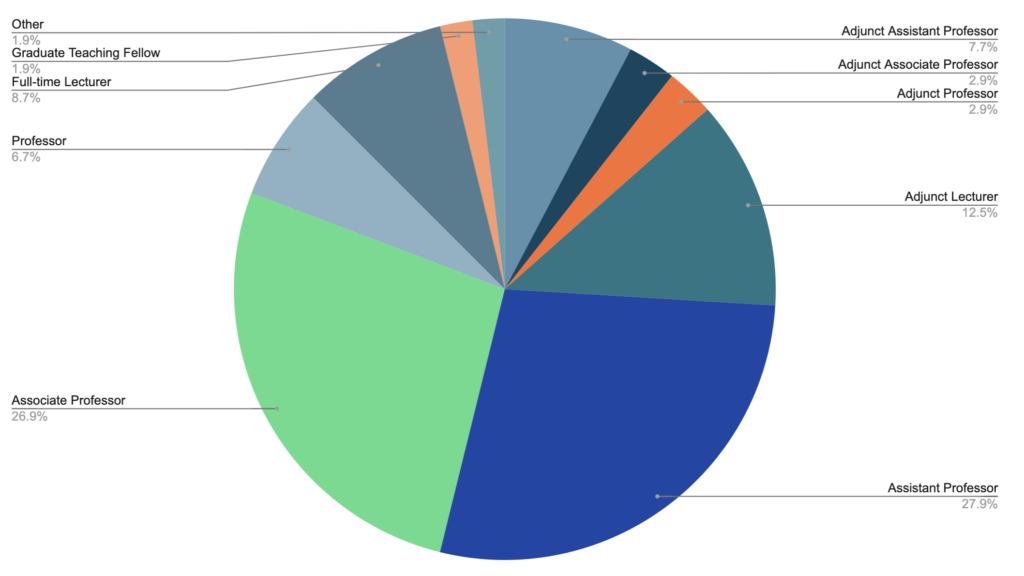
TLH Faculty Fellows By Race/Ethnicity (Self-Identified):
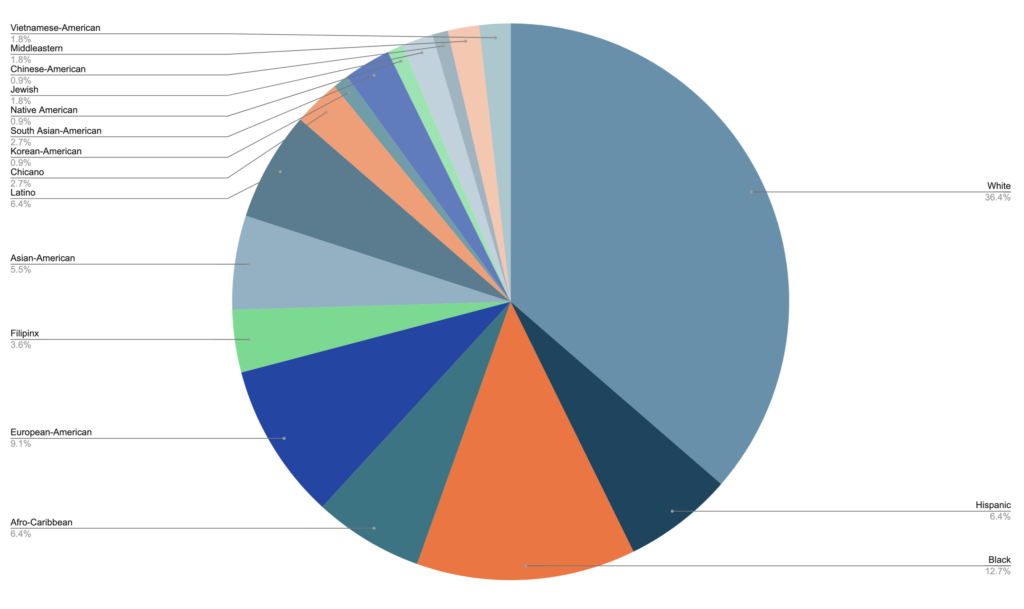
TLH Faculty Fellows by Discipline:
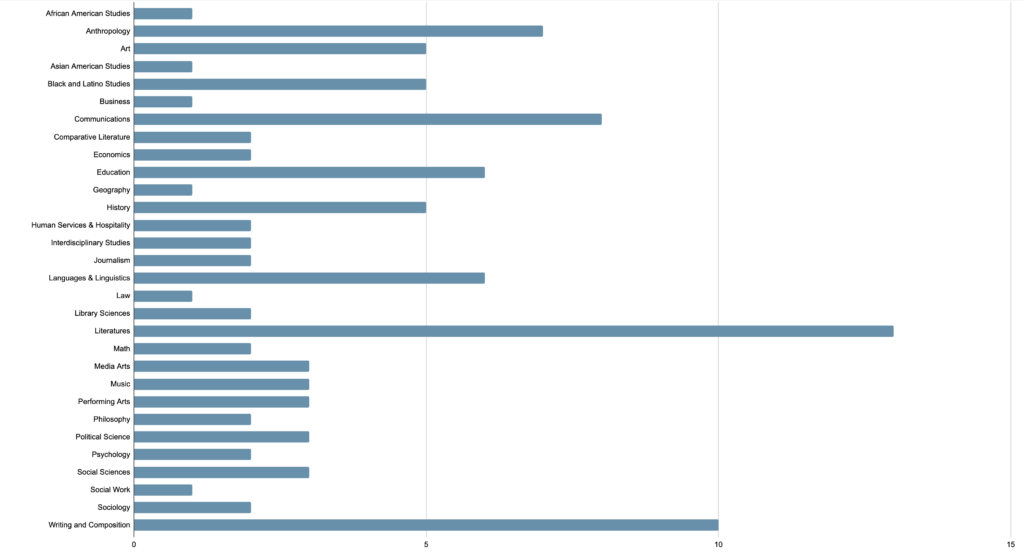
Every fellowship application was reviewed by at least two people: one TLH leadership team member and one TLH faculty advisory board member. When reviewing applications in the first year, we used a 1-5 Likert scale. In the second year, we used a 1-3 Likert scale, which we found had better results and reduced time spent reviewing applications. In both review periods, we asked ourselves these same questions:
- Based on TLH’s three goals, how much will this faculty member be contributing to the seminar?
- What is this applicant’s potential for growth?
- How would you rate the applicant’s receptiveness to active learning methods?
- How much evidence has the applicant given that they will be able to include their students in this project?
- How much evidence is there that this applicant is committed to equity and social justice?
- How much do you think this person shares TLH’s vision and will share it with others?
- How well do you think this person would collaborate with colleagues?
- Is there anything else you would like us to consider about this candidate?
The TLH program included students into its transformative work in several ways. In the first year of the grant, we asked the faculty organizing professional development workshops in our Spring 2021 faculty-led workshop series to collaborate with students on the workshops. Those students who applied and participated received modest financial aid scholarships from TLH. TLH faculty fellows in the 2021-2022 and 2022–2023 seminars likewise were asked to do the same and their students were awarded scholarships.
Students Taking Courses with Faculty Fellows
We gave faculty fellows some suggestions for how to kick off the semester using TLH methods (e.g., a collaborative manifesto activity or inventory activities like the ones we did in our Summer Institute). We sent the fellows an email before the start of classes with a sample paragraph they could put at the top of their syllabi to introduce TLH to their students. Click “Download” below to read the full letter, or feel free to reuse and recycle this paragraph welcoming students to your TLH-inspired program:
Welcome! This class with Prof. [Name] is part of an exciting initiative at CUNY called “Transformative Learning in the Humanities (TLH).” TLH focuses on equitable, creative, student-centered teaching. That means that this class is built with you—students—at the center. You are now a “Mellon Transformative Learning in the Humanities Student Scholar,” simply for showing up to this special class. This title is something you can put on your CV/resume either now, or down the road, to show future employers that you participated in this exciting program by taking this class. Thank you for being you and for being here.
Students taking courses with faculty fellows directly benefitted from TLH methods, and we surveyed them at the beginning and end of their coursework to assess the immediate impact of TLH methods.
Student Advisory Board
In its last year, TLH formed a Fall 2022 Student Advisory Board of 12 members as well as a Spring 2023 Student Advisory Board of 12 members. To be eligible, students must have been Mellon Student Scholars in a previous semester (Fall 2021, Spring 2022, or Fall 2022), and must have been currently enrolled, matriculated students at CUNY.
The board provided an opportunity to give back to the CUNY community by contributing student voices and leadership as TLH worked to forward transformation at CUNY and in higher education more broadly. As a member of the Student Advisory Board, students met three times (virtually via Zoom) with eleven other fellow CUNY students and advised TLH staff on implementing institutional change related to teaching and pedagogy. In these brainstorming workshops, they worked together to craft goals, discuss the work of writers in TLH’s Transformative Speaker Series, and planned the “Student Summit on the Role of Humanities in a Just Society,” a full-day virtual conference held on May 5, 2023. For their contributions, each student received books, a new laptop, and a $300 TLH scholarship.
Selecting the Student Advisory Board
The application form to become a TLH Student Advisory Board member asked for basic contact information, campus, and major (so we could select students from across campuses and disciplines), and one short-answer question: “Why are you interested in being on the Student Advisory Board?” We included instructions: a 300-word limit and a brief note of advice: “In the past, successful applications have included thoughtful responses to this question and were close to 300 words in length.” We noticed that this note of advice significantly improved and strengthened student responses compared to the prior application round.
In the final semester of TLH, Spring 2023, we awarded 10 of CUNY’s Centers for Teaching and Learning grants of $7,500 each for innovative pedagogical projects that forward TLH’s mission. Their work showed a strong commitment to student-centered pedagogies, active learning, and equitable classroom practices in the humanities. Below we detail the various ideas they implemented with TLH support.
Transforming Awareness into Action: Student Created and Led Applied Theatre Workshops

By Alexis Jemal
Dr. Alexis Jemal, associate professor at Silberman School of Social Work – Hunter College, developed the first iteration of an MSW elective course, Critical Social Work: Bridging the Micro-Macro Divide, in 2019 and piloted the course in 2020. This class was and is grounded in her Visionary, Philosophical Artivist (theoretical and practice-based) framework to raise critical consciousness and then tap into radical imagination to convert that consciousness into action. Dr. Jemal, with her collaborators from the Masters in Applied Theatre program at CUNY School of Professional Studies, Brynne O’Rourke and Tabatha Lopez, revised the spring 2021 course to integrate applied theatre as the modality through which we bridge the micro-macro divide.
“Applied Theatre” is an umbrella term used to describe a wide range of theatre and drama practices that are often socially engaged, politically inspired, and non-traditional in form, context and venue (e.g., teaching settings, the justice system, health care, the political arena, community development, and social service agencies). Applied Theatre can be a tool for Social Work – education, research, and practice.
The students in that 2021 class did such amazing work with their final projects, that we knew we had to share this experiential learning process beyond our classroom walls. As an ACERT Fellow and Transformative Learning in the Humanities (TLH) Faculty Fellow and having participated in the 2022 CUNY Innovative Teaching Academy Faculty development Institute, (Re-)Embedding Experiential Learning, Dr. Jemal proposed the idea to bring this work to the CUNY-Hunter-Silberman communities.
During the course, students participated in applied theatre games, activities and exercises both as facilitators and participants. Working in groups formed around their social work interests, students created and prepared their final projects for implementation. Thus, on Wednesday 4/26 and 5/3 the Silberman School of Social Work, MSW course, Critical Social Work: Bridging the Micro-Macro Divide with Applied Theatre, presented four student created and led experiential sessions that explore topics in anti-racism, diversity, equity, inclusion, and belonging (ADEIB).
On Wednesday (4/26), the first student group named Radical Rhizomes presented their session, Over, With: Exploring Communication and Conflict. In this hour-long experiential workshop, CUNY community members were invited to join in applied theater games to connect with one another and explore how we show up in (mis)communication and conflict in relationship to our roles and identities. Some of the learning objectives included:
- Relationship building:
- Participants will be able to collaborate and communicate with groups members who hold varying positions within CUNY to complete the session activity
- Critical consciousness raising:
- Participants will be able to identify how miscommunication feels in their bodies
- Participants will begin to normalize conflict and practice critical reflection and accountability, challenging our initial instincts during instances of conflict
- Participants will begin to understand how the individual experience is connected to the systemic issues
- Role investigation:
- Participants will work to understand our roles in communication within social groups
- Participants will explore different roles in experiences of miscommunication
- Participants will interrogate how our social positions and power differentials affect our experiences in classrooms/within systems
Below is a sample of the participant feedback received on the post-session survey:
- The welcoming environment, the back-and-forth between the facilitators, the sequencing of the activities — it all worked so well.
- The whole workshop was organized really well, flowed easily, and encouraged participation by the audience.
- I learned some ways of thinking about communication and its trials and tribulations
The second student group on 4/26, named The Enders, presented their session, Identifying White Supremacy in the Body, a 60-minute experiential workshop that used applied theatre techniques to explore and identify how white supremacy lives in the body. Learning objectives included:
- Help people identify how they feel in their bodies when exposed to white supremacy (WS) culture
- Acknowledge the impact of WS on our bodies
- Exercise the skill of identifying how WS shows up in spaces (educational, personal, professional, etc)
Below is a sample of the participant feedback received on the post-session survey:
- Loved how simple, easy to follow, and relaxed the facilitation and participation was
- The content was difficult BUT really manageable for an hour! I feel like we were able to get to a place where people were open and vulnerable about difficult topics given the fact it was only an hour long.
On Wednesday (5/3), the third student group named Queer Quorum presented their session, What is Gender Affirming Practice? An Immersive Exploration. This hour-long workshop encouraged participants to think creatively about what would be affirming for gender expansive clients in a clinical setting by watching and participating in a family therapy roleplay scene. Learning objectives included:
- Participants will have the opportunity to explore their own gender identities
- Expand ideas about how social workers can serve trans & gender expansive (TGNB) clients
- Examine ways that family dynamics play into care for TGNB clients
Below is a sample of the participant feedback received on the post-session survey:
- I’ve read SO MUCH about boal-style forum theater but never experienced it! I loved this! I just wish we had had more time!
- Really loved it. So layered, so much to think about, excellent work
The final student group on 5/3, named Mighty Mortals, presented their session, Mental Health Possibilities for Silberman/Hunter Students. Participants participated in an engaging experiential exercise to discuss and collectively understand the support systems available to students. Learning objectives included:
- Participants will have the opportunity to reflect on themselves and how they handle intense mental health experiences.
- Engage in the understanding that Hunter/Silberman does have resources that are available for all students.
- Exploring the roles of authority in relation to students and the emotions that can arise.
Below is a sample of the participant feedback received on the post-session survey:
- Had some really thoughtful conversations with peers
- thinking about how burnout is not individual, but systemic
- Silberman (and Hunter and Cuny) as an institution needs to take a lot more responsibility and action in the systems of harm that they perpetuate. At the same time, there is power in students and faculty coming together to commiserate and empathize.
Transformative Listening: An ACERT Podcast Club
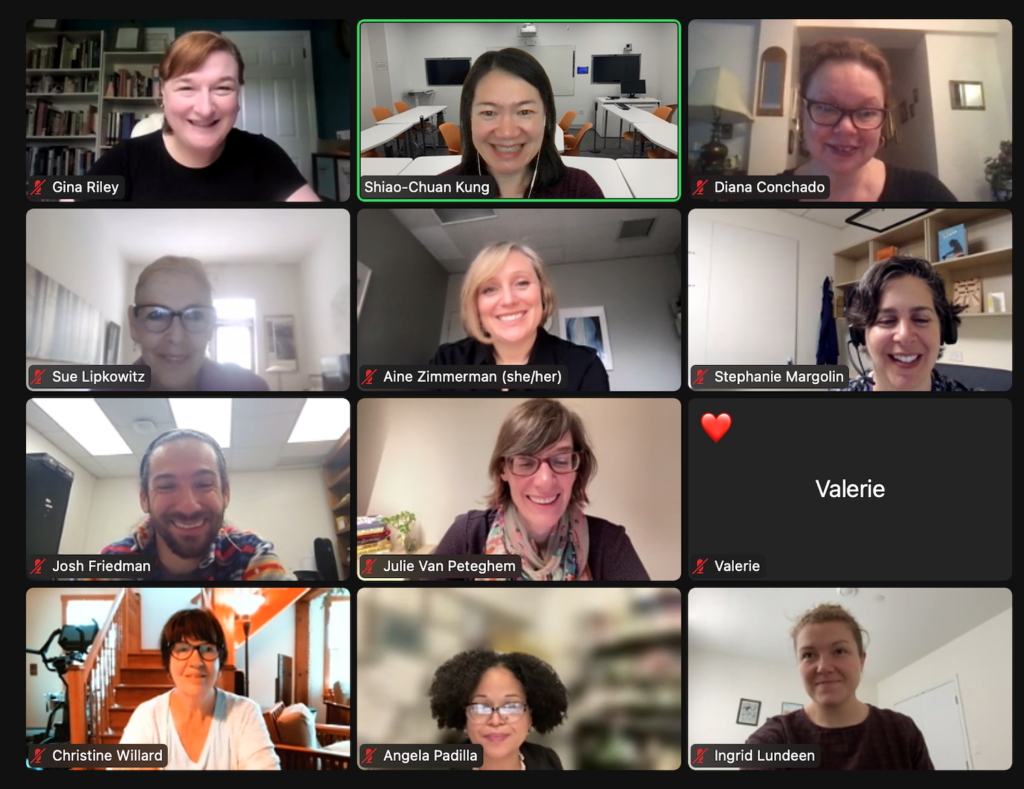
By Gina Riley
This Spring, we launched the first ACERT Podcast Club, focused on transformative teaching, thanks to the support of the CUNY Transformative Learning in the Humanities Initiative and the Provost’s Office at Hunter College. This was a funded opportunity for part-time and full-time instructors at Hunter. Each meeting, we discussed teaching practices that center and empower students based on various podcast episodes. We explored new research and approaches by leading voices in higher education, and we discussed how to implement ideas within our classroom and workspaces.
We explored 3 main topics: Engagement, Classroom Culture, and Assessment. When discussing Transforming Engagement, we asked ourselves: How can we make our classes more engaging and interactive? How different is student engagement since the return to campus and how can we address this? (Transforming Engagement Podcast Playlist). In the session focused on Transforming Classroom Culture, we thought about how we could create a strong sense of community within our in-person, hybrid, and online classes, and how to create classroom spaces that are warm and welcoming. We also asked the question “How can we build safe spaces for all students so that they feel a sense of belonging and care?” (Transforming Classroom Culture Podcast Playlist). Finally, in our Transforming Assessment discussion, we focused on three questions: Can rigor and assessment coexist in our classrooms? What is “ungrading” and how can we implement it? and What are alternative and innovative ways to create assessments and give feedback? (Transforming Assessment Podcast Playlist)
After every session, faculty also shared their takeaways on a Padlet (see examples here and here). We all learned so much from each other and had some amazing discussions. As a final celebration, we will showcase changes we’ve made to our classrooms or to our pedagogy at the “Transforming our Teaching” Showcase on May 19. Each participant in the Podcast Club will present a 3-minute lightning talk, and share 3 slides on a transformation they made to their practice. Overall, the Podcast Club was such an incredible learning experience, and a true way to highlight and create transformative teaching practices that we will use throughout our careers.
Faculty Development Events at Queensborough Community College

By Meghmala Tarafdar, Interim Director, Center for Excellence in Teaching & Learning and Assistant Professor, English and Faculty Coordinator, Global & Diversity Learning, Queensborough Community College CUNY
Queensborough Community College’s operational plan includes a framework for fostering teaching excellence. Three faculty development events funded by CUNY TLH were hosted by The Center for Excellence in Teaching and Learning (CETL) in order to support the campus level implementation of student-centered pedagogies by fostering pedagogically sound knowledge, skills and abilities (KSA’s) and improve our faculty’s ability to teach more effectively.
The campus wide initiative on Teaching Excellence Forum & Speaker Series was planned by the Coordinators of High Impact Practices with a goal of fostering greater understanding among faculty about the need for refining their assignments, improving the design of their courses, gaining strategies for increasing student engagement, creating a respectful and inclusive classroom environment, utilizing pedagogical technology more comprehensively, and learning how to assess one’s classes for future improvement.
The Teaching Excellence Forum & Speaker Series included two virtual events (10:00 AM-12:00 PM) on March 3 & March 10, 2023. The first event (March 3) began with a conversation and Jamboard posting on the topic: “What does Teaching Excellence mean to me?” This activity was followed by a lecture by invited speaker Nancy Hansel (author of Undergraduate Research at Community Colleges: Equity, Discovery, and Innovation) whose lecture addressed the points that emerged from the conversation. The lecture was followed by four breakout sessions on topics: “Assessing one’s classes for future improvement”; “Active Learning Strategies”; “Enhancing Student Engagement”; “Social Mobility and Student Choice” Faculty facilitators from High Impact Practices were selected to lead the conversation. (75 participants; 6 facilitators)
The second event (March 10) included brief presentations on “What is working for me.” Faculty presenters from across the disciplines demonstrated aspects of teaching excellence (student-Centered practices, active learning, equity-based pedagogy) followed by facilitated discussions. Each presenter shared a pedagogical approach or project that promotes active learning, student engagement, and/or a high-impact practice. Presentation highlighted three key areas related to this approach:
1. The problem/ issue that they identified or the learning outcome they set out to address with the pedagogical approach.
2. The pedagogical approach or practice they implemented and an explanation of how it promotes active learning, student engagement and/or high-impact practices.
3. The effects, impacts, and/or results of this implementation.
The session provided ample opportunities for exploring questions, tensions, and challenges of learner-centered pedagogy. Participants engaged in chat and Q & A to share their experiences, resources, concerns, and questions.
The event concluded with an announcement of the launch of QCC’s new Teaching Excellence Award. The Teaching Excellence committee, consisting of faculty from various departments, has been working to design a rubric and description for the Teaching Excellence Award. Much like the Excellence in Scholarship Award, the Excellence in Teaching award reaffirms the College’s commitment to teaching excellence. Two awards will be given out each award cycle: One to a full-time faculty member of any rank and another to a part-time faculty member.
The third event was “A Celebration of Teaching Excellence and High Impact Practices” on Friday, May 12, 2023; 11:30am – 1:30pm. Faculty had an opportunity to learn more about teaching excellence at Queensborough and the faculty who completed High Impact Practices training during the 2022-2023 Academic Year. Faculty members who participated in both sessions of the Teaching Excellence Forum (March 3 & 10) received certificate of participation. This ‘in person’ event was organized by CETL and the Coordinators of High Impact Practices at Queensborough.
Self-Reflection in Practice at BMCC

Hosted by the Center for Excellence in Teaching, Learning and Scholarship (CETLS) and the BMCC Teaching Collaboratory
Facilitated by John Beaumont (Academic Literacy and Linguistics) and Shenique Davis (Social Sciences, Human Services, and Criminal Justice)
Funded by a grant from CUNY Transformative Learning in the Humanities
Overview
Self-Reflection in Practice was a three-part series that supported BMCC faculty and instructional staff in developing a practice of sustained self-reflection about teaching and learning. This series also served as a complement to other campus initiatives such as anti-racist pedagogy, open pedagogy and OER, and trauma-informed pedagogy by providing a space for sustained reflection.
Self-reflection in Practice met three times (two hours per session) over the Spring 2023 semester. The group included 11 participants from six departments: Academic Literacy and Linguistics; Speech, Communications and Theatre Arts; Social Sciences, Human Services and Criminal Justice; Mathematics; Media Arts and Technology; Teacher Education; and the Center for Excellence in Teaching, Learning and Scholarship.
Meeting 1 – January 2023
In the first session, we defined our individual and shared goals and considered various approaches to self-reflection that matched our goals. Next, participants made individual plans, including their question(s) or focus for the semester and reflection strategy. Participant questions centered around identifying ways to develop more student-centered strategies and inviting students to be co-creators in course design, considering how joy shows up/manifests in the classroom setting (or fostering joy in the classroom setting), and ensuring that students feel a sense of belonging in the classroom setting. Then, participants constructed or proposed a reflection strategy based on the selected question or focus (see table below).
| Your question or focus | Your reflection strategy |
| How to develop more student-centered strategies | Allowing students to present their homework in front of the whole classroom. |
| In what ways am I making my class more student centered? | I’m going to work in a Word doc, mostly with voice dictation. 5-10 minutes in office hours a week. |
| What brought me/my students joy today/this semester? How can I build on that? | I am not sure about my reflection strategy. I will try a few different methods. |
| How can I make my students co-creators of the course without missing the learning outcomes? | I will let my students take more initiative and see how I handle it and where does that take the class to |
| Where is the joy, for me and for students? | Journaling 5 min after each class, maybe typing or dictation into a word doc? |
| In what capacity will I work at BMCC in the future? What will allow me to do the best work and reach students most effectively? | |
| How can I make sure students feel the sense of belonging with the course? The college? | I am going to write (by hand) in a teaching journal. Maybe after each class or perhaps after each week. |
| How can I track my students better without it being horribly burdensome for me? | Paying attention to my interactions? Noting which students I’m interacting with and whose names I’m knowing? |
| How to provide an environment that fosters lover/joy in education for my students | Journaling/photography |
| How can I invite students to be co-creators of the course while meeting outcomes? | Journaling. |
| How can create a learner centered space while still hitting all of the technical metrics they’re expected to walk away with? | Teaching & learning journals for myself and students in my classes. |
We asked participants about the resources they needed to support the reflection process. Faculty expressed the need to learn more about ungrading, access to additional reference materials on reflective practice, and setting aside time to engage in reflective practice. As a result of this discussion, we started a WhatsApp group to facilitate ongoing conversations and provided participants with a resource list (see Appendix). We also asked participants to select one or two books (provided by the program – see Books section of Appendix) to support their reflective practice.
Meeting 2 – March 2023
In our second, mid-semester meeting, we explored these questions: How’s it going? What are we learning? How do we respond to what we are learning? How have things/questions changed? How can we support each other? How can we include students in our reflective practice?
To prepare for this discussion, we asked participants to contribute to a shared Padlet by responding to this prompt: “This is a space for us to share some of our experience of self-reflection in advance of our next session. To guide your reflection, we have provided some helpful questions. Respond to the questions that most resonate with your process and experience. (1) What are you noticing about your reflective process? (2) What are you noticing about your teaching or students’ learning? (3) How have you been able to involve students in your reflection process?”
Meeting 3 – May 2023
In our final meeting, we reflected on what we learned and discussed strategies to sustain our practice for future semesters. To prepare for the discussion, participants contributed to a shared Padlet by responding to this prompt: “(1) Based on your experience, what tips and insights would you share with colleagues interested in pursuing their reflective practice next semester? (2) What might be useful to you to bring closure to this experience?”
Closing Thoughts
Some participants kept an ongoing teaching journal, while others reflected more on the fly. Faculty took creative approaches to reflection, using chunks of available time (e.g., while commuting) and making use of a variety of technologies (e.g., Google sheets, Notion, phone voice memos). While not everyone adopted a structured reflective practice, participants shared that simply having a space for conversation about reflection was beneficial to their teaching. Our time together laid the groundwork for an ongoing, reflective practice. As one participant summed it up: “From the wonderful group members, I have gathered a variety of ideas, tools, and sources that can guide me in my self-reflection journey… Looking at this padlet and reflecting back on the work that we have done in the group, I am ready to undertake this journey: 1. by clarifying the purpose and intention behind the self-reflection; 2. asking intentional questions; 3. being emotionally and mentally prepared for self-reflection… [T]his semester was a start but I am ready to do so much more!” Several participants echoed this desire for more opportunities such as this in the future.
Appendix – Strategies and Tools for Reflection
Culbert, P. (Fall 2022). Better Teaching? You Can Write On It. Liberal Education, AAC&U. This short article encourages you to use writing as a useful form of reflection.
Writing a teaching diary – Think © BBC | British Council 2004 This is a practical one-page approach to organizing a teaching diary.
Reflective Teaching Berkeley’s Center for Teaching & Learning (2020) In Self-Reflection in Practice, one of the books we will offer you is Brookfield (2017) Becoming a Critically Reflective Teacher (see below). Berkeley’s approach to reflective teaching is based on the first edition of Brookfield’s book.
How To Be A More Reflective Teacher TeachThought, This resource gives 10 very practical tips for being reflective in your teaching.
Reflective Practice Faculty and Staff Toolkit The Center for Engaged Learning, Providence College, This link provides some simple frameworks for reflective practice.
Reflective Teaching Practice & IDEA Office for the AdvanReflective Teaching Practice & IDEAcement of Teaching and Learning, The University of Rhode Island, This link provides some background on reflective practice. Check out “Starting a Reflective Practice.”
Reflective Teaching/Reflective Teaching Examples Poorvu Center for Teaching and Learning, This resource offers strategies to engage in reflective practice through self- and external forms of assessment.
Teaching Squares Colorado State University, A teaching square is an approach to group reflection. It might be something you could try out with colleagues in your department.
Books
Brookfield. (2017). Becoming a Critically Reflective Teacher. John Wiley & Sons, Incorporated. Here is the link to the ebook in the BMCC library.
hooks. (1994). Teaching to transgress : education as the practice of freedom. Routledge. https://doi.org/10.4324/9780203700280. Here is the link to the ebook in the BMCC library.
Venet. (2021). Equity-centered trauma-informed education (First edition.). W.W. Norton & Company. https://wwnorton.com/books/9780393714739
Davidson and Katopodis. (2022) The New College Classroom. Harvard University Press. https://www.hup.harvard.edu/catalog.php?isbn=9780674248854&content=toc
Other References
Farrell, T.S.C., (2022) Reflective practice in language teaching. Cambridge Elements Series. Cambridge University Press. (Book)
Kirpalani, N. (2017). Developing self-reflective practices to improve teaching effectiveness. Journal of Higher Education Theory and Practice, 17(8), 73-80., Practical suggestions with helpful, guiding questions.
Minott, M. (2019). Reflective teaching, inclusive teaching and the teacher’s tasks in the inclusive classroom: a literary investigation. British Journal of Special Education, 46, 226-238. https://doi.org/10.1111/1467-8578.12260
Open Access: https://nasenjournals-onlinelibrary-wiley-com.bmcc.ezproxy.cuny.edu/doi/full/10.1111/1467-8578.12260. Connects reflection to inclusive teaching.
Rogers, R.R. Reflection in higher education: A concept analysis. Innovative Higher Education, 26, 37–57 (2001). https://doi.org/10.1023/A:1010986404527, Full article available via BMCC, Speaks to the background, value, and implications of the reflective practice and how to foster such a practice.
Virtue, E. E. (2021). Pedagogical reflection: Demonstrating the value of introspection, Journal of Effective Teaching in Higher Education, 4(1), 128-142.DOI: https://doi.org/10.36021/jethe.v4i1.213, Speaks about pedagogical reflection based on phronesis- a practice of reflection that becomes regular and holistic, rather than a one-off attempt at reflection.
Pedagogies of Care Workshop at the Macaulay Teaching and Learning Collaboratory

By Lisa Brundage, Director of Academic Affairs, Macaulay Honors College
The Macaulay Teaching and Learning Collaboratory (formerly known as the Instructional Technology Fellow/ITF Program) has deep roots in helping students explore and have agency over the technologies they encounter in their lives and academic works. As early adopters of open-source systems like our eportfolios, we have embraced teaching students about their digital footprints, privacy, and what it means to be both a consumer and creator of digital content. In March 2020, we were, of course, the mainline of support for our faculty switching to emergency online teaching. Working in community with each other in the TLC provided a solid base of knowledge for technical aspects of the work, but also a place to talk about the difficulties we, our students, and our faculty colleagues were facing in this suddenly changed world, especially as NYC took the hardest hits in the earliest wave of the pandemic. Well before the pandemic, we had already been engaged in conversations about supporting student-centered pedagogies and unpacking some of the terms that are commonly associated with honors education: excellence, rigor, elite–especially in the context of CUNY’s equity and access mission.
The 2022-23 academic year has occupied an especially peculiar place in the continuum of pandemic recovery, a year when we took stock of what coming back to campus, addressing so-called “learning loss,” and trying to re-establish expectations could and could not achieve for both students and educators. Staffed primarily by GC doctoral candidates, the Macaulay TLC has a dual perspective on these experiences, and its members also occupy a midway point between the undergraduate students and faculty members that affords multiple perspectives and connections with our honors students. Feeling the fatigue of both the pandemic and recovery efforts, our team voiced the need for professional development that would help spark new ideas and provide more tools to meet the needs and mission of the college. With the generous support of TLH, we were able to bring Jesse Stommel for a talk and workshop on Pedagogies of Care on March 6, 2023. We hosted about 40 community members for the talk, before breaking into a more intensive workshop for our staff.
The talk and workshop gave us an opportunity to address some of the common difficulties we have, for example, encouraging experimentation and growth in a grade-driven environment (Macaulay students are required to keep a GPA of 3.3 initially, and then a 3.5 after their first three semesters). This requirement disincentivizes students from pursuing coursework that they may be interested in but either decline to take or withdraw from with a preoccupation on grading. Students are both motivated by and scared of grades, and we discussed ways to support faculty in taking new approaches to their grading practices.We plan to pilot ungrading and contract-based grading workshops and reading circles in AY 23-24, and hope to establish a community of practice within the honors college of instructors who want to do this work. Students would be encouraged to take risks and experiment with unfamiliar coursework, resources, and approaches. We also have two faculty members supported by the grant who will be developing new, care-based recommendations and language for faculty to add to their syllabi. These are just a couple of practical and action-oriented steps that came out of a day that included a much-needed break to step back and consider how we can care for each other and our students in ongoing times of uncertainty, austerity, and change. Together, we can provide the community and care that we and our students need for transformative learning.
College of Staten Island: Technology for Pedagogy
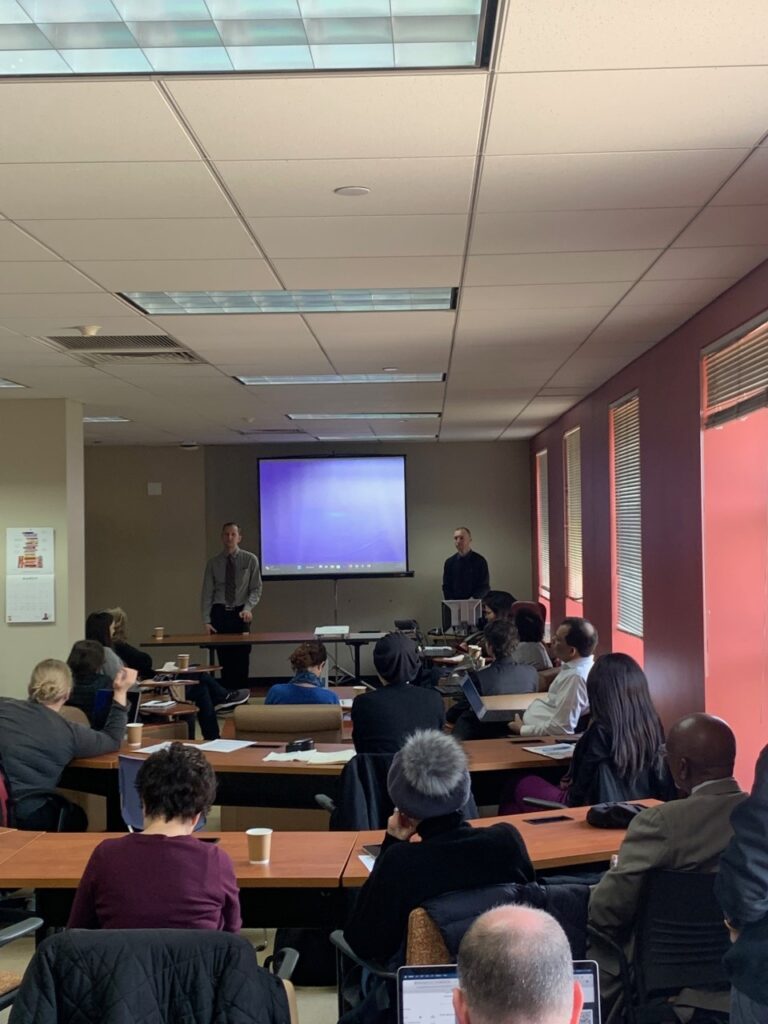
By Wilma Jones, Director, Faculty Center for Professional Development and Fausto Canela, Academic Technology Specialist, Faculty Center for Professional Development, College of Staten Island (CSI)
A goal in this year’s agenda of the Faculty Center for Professional Development at the College of Staten Island (CSI) was to revitalize the Center’s physical and virtual spaces facilitated with programming utilizing a smart technology configuration. The award inspired new confidence in the staff at the Faculty Center to seek out and coordinate a variety of programs, other than the usual Blackboard-centric ones. This award enabled the Faculty Center for Professional Development to purchase innovative equipment needed to upgrade obsolete equipment that would facilitate, transform, and deliver better quality presentations, whether in-house or virtually.
Such technology supported 16 in-person, virtual, and hybrid professional workshops and lectures were scheduled and executed from January 2023 to date. These events focused on enhancing digital skills and student engagement. In less than 5 months, these events, to date, have yielded 475 attendees from 265 individuals from academic and non-academic divisions of the CSI community. The Faculty Center promoted events far and wide, which attracted many first-time attendees other than full-time faculty, including adjunct faculty, lecturers, and CLTs, as well as professional staff (HEOs, and IT Specialists) from non-academic divisions of the college.
Some events focused on enhancing instructors’ digital skills to meet our students’ diverse learning abilities. Titles of these included:
- ChatGPT: Implications and Possibilities
- Using “Navigate CSI” for Early Alerts and Feedback
- Technology Day (featured ChatGPT, Virtual Reality, HyFlex equipment, and TEAMS)
- Tooling Around: Five Fun Tools for the Classroom (Picker Wheel, PollEverywhere, Mentimeter, Jamboard, and Padlet)
- Tips for Creating Accessible Digital Content
- Using Loom to Create 3-Min Video Clips
Lectures that sparked new knowledge and stimulating conversations with the product of enhancing student engagement included:
- Antiracist Pedagogy: Lightning Talks
- Becoming Allies for LGBTQ Students: SafeZone Training
- How to Recognize and Help Students in Distress
- Open Educational Resources Showcase @ CSI
- Open House event that featured three Poster Sessions — “Integrating Computational Literacies in Teacher Education across the Disciplines” (see photo below), “Social Justice, Antiracism, and Active Media: How/Why I Devised the Course,” and “Community Spectacular Initiative Museum: A Game-Based Learning Project”
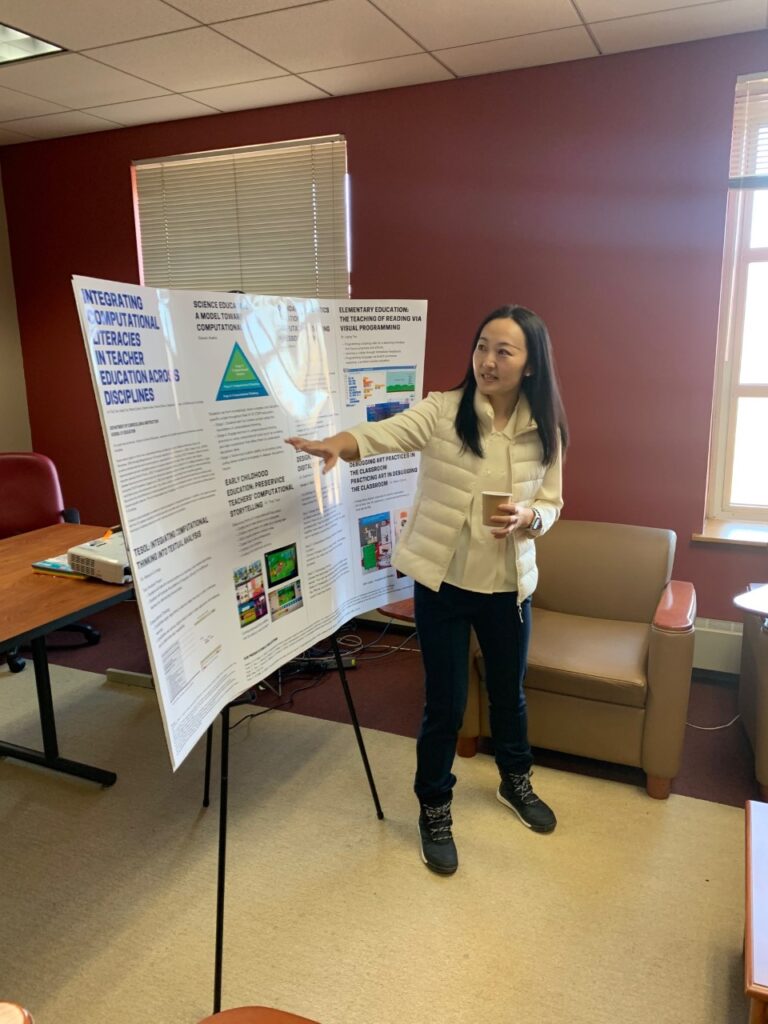
Since 2017, the CSI Faculty Center for Professional Development has had fewer than eight (8) professional development programs per year with less than 70 individuals in attendance. The Transformative Learning in the Humanities Grant has revitalized the Faculty Center into a vibrant and lively hotspot for learning where over 265 instructors and professional staff convened to learn from 16 thought-provoking pedagogical or digital enhancing skills’ professional development programs. Presently, a series of professional development summer workshops are being planned for the week of June 12th-16th and August 14th-18th where we are certain the smart technology configuration will be a conduit to most presentations for in-house, virtual or hyflex programs.
Empowering City College Faculty and Students Through Digital Humanities Tools and Methods
By Stefano Morello and Olivia Ildefonso, Digital Fellows at the City University of New York
Over the past three years, the City College of New York (CCNY) has made significant strides in integrating Digital Humanities (DH) pedagogy across the college, thanks to two National Endowment for the Humanities (NEH) grants awarded in 2020 and 2021. These grants have enabled the Division of Humanities and the Arts and the Teaching and Learning Center to promote DH-informed teaching methods, with the ultimate goal of developing a DH minor.
One significant challenge in encouraging more faculty to adopt DH methods in their classrooms has been the extra effort required without additional pay. To further support faculty in learning new digital skills and adopting DH approaches, we (Digital Humanities Fellows Olivia Ildefonso and Stefano Morello) were awarded a Transformative Learning in the Humanities grant in Spring 2023.
This grant allowed us to provide financial support to faculty interested in incorporating digital assignments into their courses to teach digital literacy and DH skills through experiential pedagogy. We received close to 20 applications and selected 7 faculty members (5 full-time and 2 adjunct) who received $1,200 stipends (of which about 70% came from the TLH grant and 30% from the Division).
To participate in the program, faculty were required to attend a two-day remote DH bootcamp, and in-person lunch and at least two remote consultation sessions with the Digital Fellows. They will also be expected to teach a course with a DH-based assignment in Fall 2023.
The DH bootcamp took place over two days, featuring a series of workshops and discussions designed to familiarize faculty with various DH tools and pedagogical approaches.
On May 5th and 12th, 2023, two day-long workshops were held, covering a range of topics related to DH integration in the classroom. The first day introduced the curriculum and an overview of the debates around and in the field, explored ArcGIS Online for mapping, and concluded with discussions on tool implementation and potential challenges. Participants created a map layer of their favorite public places in New York as homework. The second day delved into digital archive assignment platforms, ESRI StoryMaps for interactive narratives, and project management for DH assignments. Attendees also enjoyed free social time for networking and to exchange ideas. The final assignment involved designing a DH class project and reverse-engineering it into smaller assignments.
On May 16th, an in-person lunch was held to reflect on the workshops, discuss the take-home assignments, and talk about next steps. Throughout May and June, each participating faculty member will schedule two consultations with the fellows to plan their assignments and courses.
Learning from our experience as Digital Fellows at the Graduate Center and as curriculum developers and teachers for the Digital Humanities Research Institute, during the workshops, we emphasized the importance of developing DH communities of practice, to keep the momentum going and provide each other support past the duration of the bootcamp.
The Digital Humanities bootcamp, supported by the Transformative Learning in the Humanities grant, will empower CUNY faculty to integrate DH tools and methods into their courses, enhancing the learning experience for students and solidifying CUNY’s commitment to staying at the forefront of digital pedagogy.
Assignment Hack-a-thon and OER Focused Inquiry Group at the Graduate Center’s Teaching and Learning Center

By Laurie Hurson, Assistant Director for Open Education
The CUNY Graduate Center’s Teaching and Learning Center (TLC) supports GC students’ in developing knowledge of the fundamental elements of college instruction and helps new and seasoned instructors craft critical and caring pedagogical approaches for teaching at CUNY. In a recent TLC survey, GC graduate students indicated the need for more support for teaching, and specifically pointing to the challenge of sourcing materials to use in their courses. During Spring 2023, with the support of the Transformative Learning in the Humanities Initiative, the Graduate Center Teaching and Learning Center (TLC) developed two projects to support graduate students’ engagement with inclusive pedagogy and open educational resources.
In February, the TLC hosted an “Assignment Hack-a-thon” that invited GC student instructors to participate in an event that blended workshop, collaborative working session, and community gathering. During the Assignment Hack-a-thon graduate students discussed inclusive and student-centered teaching methods, and reflected on how they have enacted these practices in their courses. Attendees then conducted a peer review of previously used assignments. When “hacking” their assignments, attendees worked together to explore ways to: make assignments more relevant for CUNY students, use educational technologies to make low stakes assignments more engaging, and alter assignments to embrace multiple ways of learning and creating knowledge.

Attendees’ reaction to the event was positive, and many graduate students reflected on the benefits of thinking through their pedagogy with peers. Following the event, hack-a-thon attendees crafted new versions of their assignments, and shared them with the TLC. These openly-licensed assignments have provided the foundation for the TLC’s new Assignment Library, a collection of materials developed by CUNY instructors for CUNY instructors. Event attendees are excited about the library and many have met with TLC staff to provide preliminary feedback on the Assignment Library website. The Assignment Library will continue to grow with ongoing support from the TLC and we hope it will become a valuable resource for all instructors teaching across the CUNY system.
The support from the TLH also facilitated graduate student engagement in a Focused Inquiry Group (FIG) to curate disciplinary Open Educational Resources (OER) collections. After a short application process, six participants were selected to develop collections of teaching materials that could be used in a variety of courses in their discipline. The FIG participants have met several times this semester to begin developing their projects, and will receive support over the summer to complete the collections. Elvis Bakaitis from the GC Mina Rees Library, who has also worked with several of the FIG participants in the past, attended our second FIG meeting to share their expertise on open licenses and sourcing open access content (thank you, Elvis!). The collections will be available in the Fall 2023 and will focus on the following topics:
- Community Organizing and Social Work, Jamie Borgan
- Ethics, Critical Thinking, and Feminist Philosophy, Yingshihan Zhu
- Evolution and Behavior & Comparative Animal Behavior, Jennifer Savoie and Lyndsay Hage
- Marking Gender in Spanish: A Guide for Language Learners, Silvia Rivera Alfaro
- Teaching Environmental Psychology Critically (TEPC), Erin Lilli
Sourcing and creating open materials requires significant time and effort, and these disciplinary collections aim to ease the labor burden for graduate students and adjuncts who are seeking to teach with low or no cost materials, while also cultivating more discussion and collaboration around teaching within the GC’s academic programs. The TLC is working with the FIG participants to identify departmental partners to help publicize these resources and support their continual development and in doing so, build institutional support for teaching with accessible and open materials.
The Spring 2023 projects supported by the TLH created opportunities for graduate students to receive support for developing teaching materials, and allowed the TLC to guide students in making these materials open to all instructors teaching at CUNY. Both projects lay the foundation for current and future students to access and contribute openly licensed materials that foster inclusive and accessible pedagogical approaches in CUNY classrooms.
Recentering Student-Centered Teaching and Learning within Student Experience and Reflection: Collaborative Journeys at John Jay College of Criminal Justice
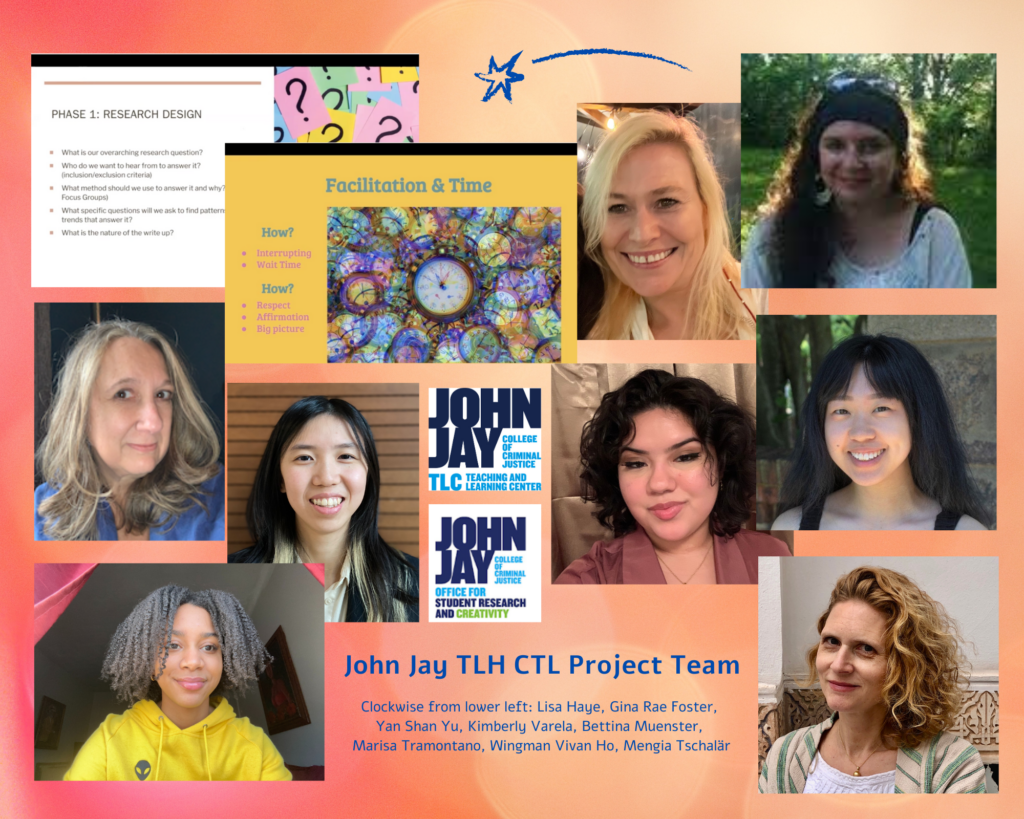
By Gina Rae Foster, Bettina Muenster, Mengia Tschalär, Marisa Tramontano, Yan Shan Yu, Vivian Ho, Lisa Haye, and Kimberly Varela
We reenact archetypal stories so frequently that we may miss their significance and our own roles when we are caught up in the action. At John Jay, our TLH Center for Teaching & Learning (CTL) project has become one of these archetypes which represents a journey undertaken by one character who then encounters a new friend with additional resources and skills. As a pair, these two continue to meet and befriend others to create a powerful community capable of meeting unexpected challenges and creating extraordinary possibilities. In our student-centered TLH project, we build on the expertise and combined knowledge of John Jay students and faculty alike. After the initial call for proposals sent to Gina Rae Foster, Director at CUNY’s Centers for Teaching & Learning, a mutual acquaintance recommended connecting with Bettina Muenster, the Assistant Director of our Office for Student Research and Creativity. She brought on board 2 undergraduate students (Lisa Haye, Economics, B.S. 2024, and Kimberly Varela, Criminal Justice, B.S 2023), 2 graduate students (Yan Shan Yu, Forensic Psychology, M.A. 2024, and Wingman “Vivian” Ho, Forensic Psychology, M.A. 2024) interested in participating as focus group leaders and faculty mentees. Further conversations brought in Mengia Tschalär, TLH Faculty Fellow and Adjunct Associate Professor of Anthropology, and Marisa Tramontano, one of our new lecturers in Sociology. Our team covers multiple disciplines and represent a variety of nationalities and generations. Together we are a lively, determined, and passionate cohort and our journey has been one of serendipity and camaraderie! We are traveling towards a quantitative and qualitative analysis of student focus group responses to questions about their learning experiences in courses taught by funded faculty seminar participants that were offered by the TLC from 2016-2021. Through this analysis, we plan to amplify our assessment of our faculty seminar impact through gathering feedback from students experiencing these innovative pedagogy-supported learning experiences. We anticipate that the analysis will demonstrate whether or not students find positive learning experiences in these courses with these instructors and that the analysis will also identify areas in which students believe they could be taught more effectively and differently.
Our TLH funded project builds on previous assessment of these faculty seminar participants, who were surveyed through a Qualtrics partnership in Spring 2021. This survey asked seminar alumni to recall their learning experiences and to share what concepts and practices they were implementing from their seminars into their teaching. When we conducted the survey, we also asked respondents to identify their levels of confidence in their own teaching and to name the types of resources and peer connections they were using to deepen their teaching and their understanding of their students. At this point in our journey, May 1, we are happy to share that we have accomplished multiple collaborative tasks. We have been active in co-designing and engaging in trainings, the codevelopment of student focus group materials, and the deepening and strengthening of our intrepid community. Yan Shan Yu and Gina Rae Foster have co-written and submitted an IRB protocol to authorize our use of student information related to the focus groups. As part of our IRB submission, Kimberly Varela, Vivian Ho, and Lisa Haye created screening materials for students interested in participating in the focus groups. We have created the focus group questions with intensive discussion between the students on our team and our expert faculty.
As we have learned from Mengia Tschalär and Marisa Tramontano, who shared their materials and lessons from student qualitative research collaborations, we have developed resources that we believe others can use to discuss learning with students and support students who are leading these conversations. Our Assistant Director of the Office for Student Research and Creativity, Bettina Muenster, has been instrumental in inspiring, guiding, and moving us through these processes. We are proudest of our student focus group and facilitation trainings, which we would like to present and share with others doing similar work across CUNY. Our faculty mentors, Marisa Tramontano (Sociology) and Mengia Tschalär (Anthropology) co-designed a training that provides context and practice for working with focus groups, which we connected with a workshop in facilitation roles and skills with our Teaching & Learning Center Director Gina Rae Foster. It was exciting to combine training in effective communication with preparation to collect and analyze qualitative data and doing this work with students strengthened and enriched all of our understanding. Looking forward, we are eager to begin recruiting students and working with the focus groups. We anticipate intense conversations over the summer as we create codes and annotate transcripts of the student conversations. Once this is done, we will begin analyzing our findings and preparing to write, present, and share what students believe they are gaining from learning with Humanities faculty who have engaged in innovative pedagogies through formal faculty development. Even more importantly, we are eager to discover what and how students want to learn that they are not currently experiencing in these courses.
Pedagogy in Practice Intensive at Brooklyn College
By Malka Simon (Ph.D. Director), Roberta S. Matthews (CTL and Lecturer, Art), Donna Granville (Ph.D. Associate Director), Roberta S. Matthews (CTL and Assistant Professor, Sociology)
With the generous support of the Transformative Learning in the Humanities Initiative, the Roberta S. Matthews Center for Teaching and Learning ran a Pedagogy in Practice intensive from January 10-12, 2023. The 3-day practicum offered hands-on workshops that showed participants how to put pedagogical ideas to practical use in areas such as syllabus development, assignment design, student engagement, building classroom community, and more. Anti-racist pedagogies were emphasized throughout, allowing participants to gain an understanding of the breadth and depth of this approach. Participants who completed at least five of the six workshops received a stipend and certificate of completion. Workshop leaders also received stipends. The full description of all workshops offered can be found in the addendum below.
This idea grew out of faculty experience with past workshops. While pedagogical sessions can offer great ideas, all too frequently we run into roadblocks during implementation. Pedagogy in Practice workshop leaders presented the pedagogical concept and then set aside time during the session for attendees to start working on that concept, designing elements for the classes they were scheduled to teach in the spring. If questions arose, workshop leaders were on hand to assist and troubleshoot. We also hosted freeform discussions at lunchtime, between formal workshops, to further hash out and reflect upon workshop material. Formal workshop sessions had high attendance, attracting an average of 40 participants. Lunchtime conversations were more sparsely attended, but they offered a really great opportunity to talk, get to know faculty from across departments, and toss around ideas.
Feedback was overwhelmingly positive. Exit surveys from the week’s events indicated high levels of satisfaction with the topics presented and the hands-on time devoted to working on said topics in order to incorporate them into spring teaching. In March, the CTL ran a faculty survey for feedback on the year’s programming, and several respondents mentioned Pedagogy in Practice as a highlight.
The success of our January event inspired us to plan another Pedagogy in Practice series in June. The upcoming intensive will be geared toward faculty developing freshman seminar sections, but will be open to anyone wishing to attend, as the topics are general enough to interest all faculty. The structure will be the same as it was in January, with time set aside each day for practical implementation. Topics are being finalized, but will include sessions on the Pedagogy of Kindness; teaching to diverse learners; metacognition and course design; a how-to session on social annotation apps; strategies for effective group work; and more.
We are grateful to TLH for funding Pedagogy in Practice. The week was intense, but that intensity generated so much excitement, great conversation, and practical ideas. It also helped build community among faculty from a wide variety of departments, which can be especially difficult to accomplish in this post-Covid era. We are looking forward to making this a regular event at the CTL, and are excited to continue learning and growing as teachers.
The CUNY 1969 Project: Teaching and Learning the Struggle for Black and Puerto Rican Representatio
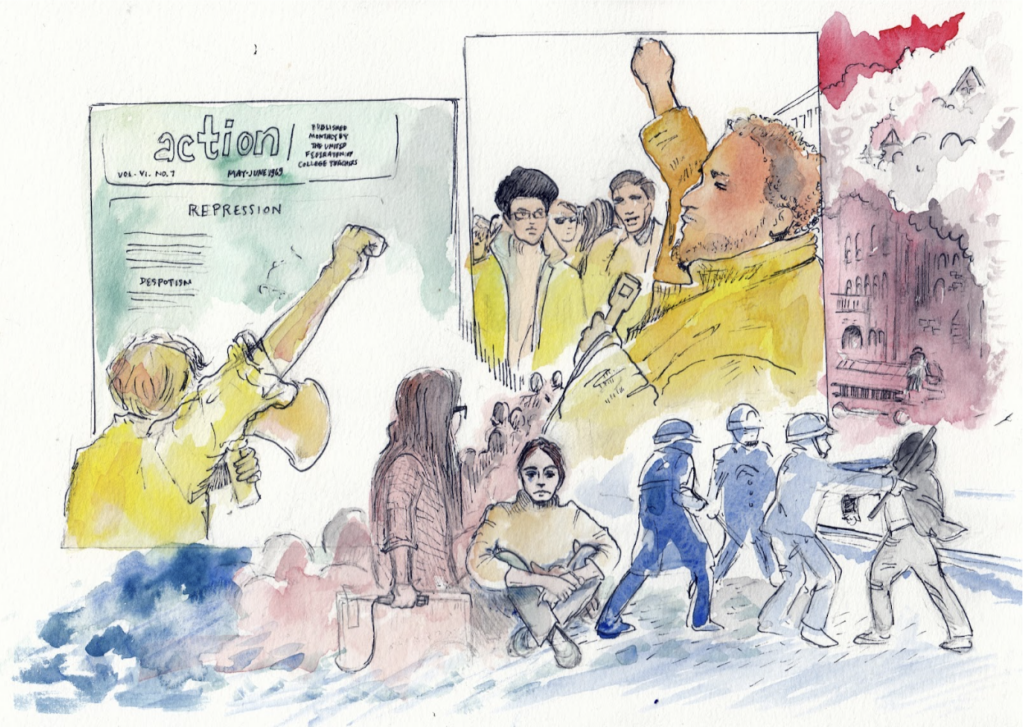
By Hamad Sindhi and Seth Graves, CUNY 1969 Project Managers
In 2021, the Baruch Center for Teaching and Learning (CTL) launched the CUNY 1969 Project, an interactive Open Educational Resource (OER) platform that explores the history of the 1969 Five Demands student protest movement, which fought for policies to reconstitute the racial composition of incoming CUNY students. Through the curation of historical texts, recordings, and interviews, the project provides an applied showcase of CUNY’s institutional archives that can be used in classrooms across CUNY.
From the student movements of the 1960s to the recent demands for antiracist classrooms and pedagogies, CUNY’s history of activism often remains frozen in archives and does not get passed down to its undergraduates. The work of the CUNY 1969 Project seeks to grapple with this problem by engaging CUNY stakeholders to reanimate the history of student activism at the university, re-engage with the archives that store it, and pass this knowledge down to students.
On February 8th of this year, with support from the Transformative Learning in the Humanities Grant (2023), we hosted and recorded a panel of three experts who have used the CUNY 1969 Project in their teaching and research. Panelists and attendees were invited to reflect on this history, teaching opportunities across disciplines, and the possibilities of students’ own agency within the university.
You can view the panel here:
And thanks in part to funding from the Transformative Learning in the Humanities Grant (2023) and the OER Initiatives Grant (2022, 2023), the CTL has been able to host a June “CUNY 1969 Teach-in and Retreat” program, first in 2022 and again this year. The retreat brings together CUNY scholars to closely examine the narrative, debates, and histories of open admissions at CUNY and the lasting legacies of student and faculty activism.
Over four weeks in June 2023, the second CUNY 1969 Teach-in will host a cohort of subject matter experts in CUNY institutional history, using and teaching with library archives, Creative Commons licensing, and undergraduate student research. Following the format of our successful (but Baruch-focused, due to more limited resources) Summer 2022 Teach-in, our Summer 2023 programming will facilitate synchronous and asynchronous instruction, discussion, and presentation on CUNY history, with a particular focus on student activism towards a more just and equitable university.
Teach-in participants will collaborate over open-access educational resources associated with the CUNY 1969 Project that interact with their interests, such as a lesson plan or assignment for future instructors using CUNY 1969 Project material.
Community partnerships—among departments, organizations, CUNY faculty and staff, and alumni—have been essential to the CUNY 1969 Project. The previous Teach-in created needed space for mindful conversations about CUNY’s history and future. Receiving the TLH grant has allowed us to scale up this project’s reach to a CUNY-wide community of teachers and scholars in the humanities and social sciences. We seek to support and develop instructors across CUNY who want to engage their students and peers in conversations and activities related to the activist history of our institution as well as, more broadly, transformative learning in higher education.
We invite you to check out the CUNY 1969 Project and join our efforts to center the university’s own complex history of students, faculty, staff, teaching, and learning.
Transformative Speaker Series
TLH hosted illustrious visitors in our Transformative Speakers Series. In its second year, TLH hosted Susan D. Blum, Felicia Rose Chavez, Jesse Stommel, and Jamila Lyiscott. Dr. Blum led the interactive workshop “Practicing Ungrading: Why and How” in October 2021, sharing knowledge from her influential edited collection Ungrading: Why Rating Students Undermines Learning (and What to Do Instead). Dr. Chavez led a two-part workshop in February 2022 called “Anti-Racist Pedagogy: Adapting Our Teaching Habits,” where she outlined tools for transforming teaching, such as co-creating curricula with students. Dr. Stommel’s “Ungrading and Alternative Assessment Workshop” in March 2022 opened a reflective dialogue on antiracist, inclusive teaching and how we can move beyond grading. Finally, Dr. Lyiscott led the workshop “Liberation Literacies Pedagogy: At the Intersection of Language, Race, and Power” in April 2022, detailing the difference between liberation and inclusion in the classroom and beyond. Over 1,300 faculty, staff, and students at CUNY and beyond attended and engaged in this series.
In its third year, TLH hosted or co-hosted Lorgia García-Peña in collaboration with the Publics Lab; Bettina Love, author of We Want to Do More than Survive: Abolitionist Teaching and the Pursuit of Educational Freedom; MacArthur “Genius Grant” winner Kiese Laymon, author of Heavy and How to Slowly Kill Yourself and Others in America; Vietnamese-American writer Ly Tran, author of the memoir House of Sticks; and renowned poet Tracie Morris, the first tenured African-American poet of the Iowa Writers’ Workshop after serving as the program’s inaugural distinguished visiting professor of poetry.
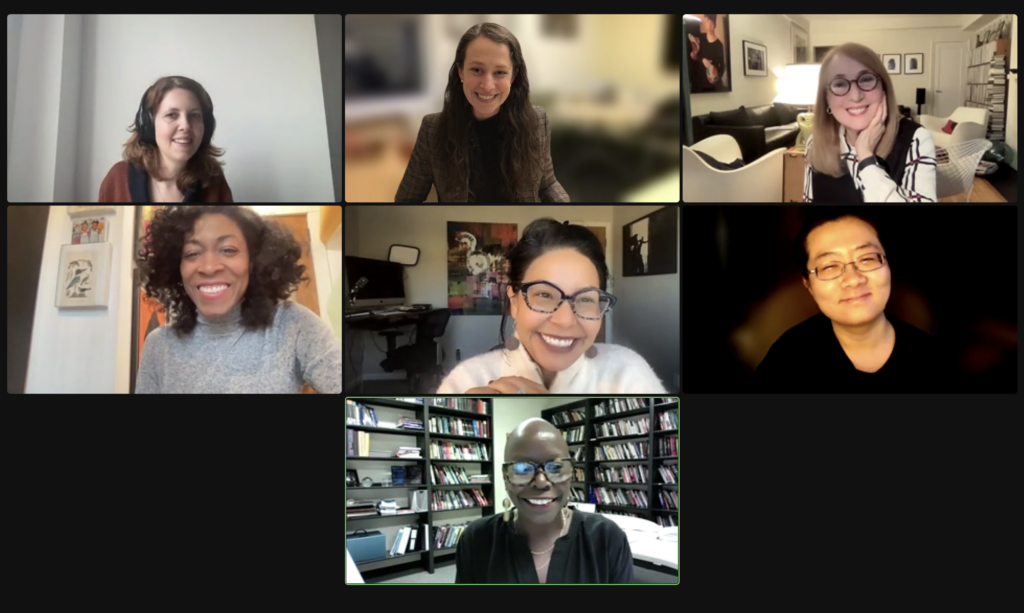
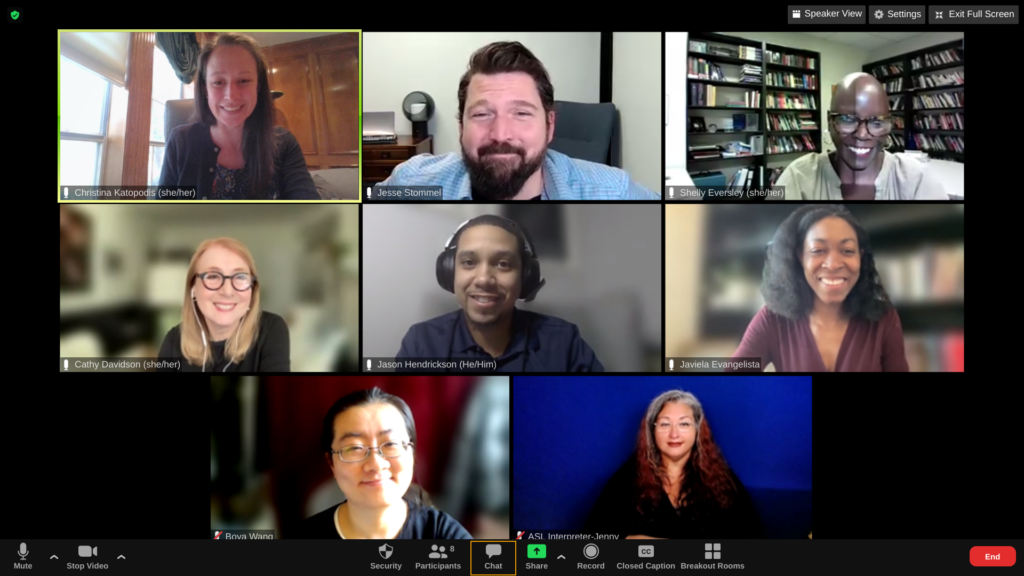
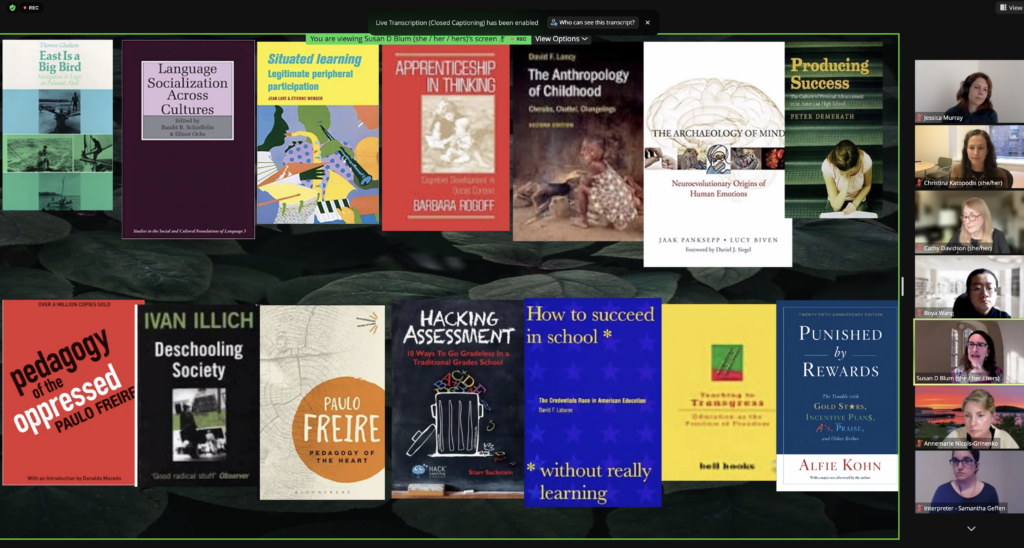
Inviting Speakers
Cosponsored Events
In Spring 2021, during the COVID-19 global health crisis, the TLH program dedicated support specifically to showcasing and broadcasting the work of our own CUNY faculty. Rather than turning to outsiders, we led by honoring the practices and vision of CUNY faculty whose commitment to racial justice and equity are central to the mission of TLH and crucial to the transformative practice of higher education.
TLH offered $500 awards to honor those 90 faculty organizing 75 professional development workshops in accordance with TLH’s mission. They organized these workshops in collaboration with 80 students who received $300 scholarships. We partnered with and supported our faculty in their efforts to share innovative ideas and methods with the CUNY community and the general public: we provided TLH Open Office Hours to mentor faculty on how to make their workshops engaging and interactive using TLH methods; we promoted their events by creating event graphics and setting up Eventbrite pages to track RSVPs; and we helped to broadcast their events across CUNY through our social networks.
Cosponsored events could be, but were not limited to, professional development workshops and presentations on innovative pedagogy, reading or viewing discussion groups, faculty-organized symposia, public art performances and other event types that inspired transformative teaching and learning.
Event Accessibility
TLH arranged for full accessibility of our public events by offering CART (live captioning) and ASL interpreters. We chose to offer these access features by default as a way to include people who are Deaf or hard-of-hearing without requiring extra work on their behalf or creating any uncertainty about accommodations. Two ASL interpreters are typically required for any event, and CART providers may need a backup depending on the length of the event. The cost of both services was approximately $600 per event.
Running a Meeting: Agenda Tips
- Current Agenda on Top
- Each week’s agenda goes at the top and is dated; notes are kept in the agendas, so we can bring forward what we haven’t done, have a record of what we have done and when
- All participants add their agenda notes prior to each meeting, not just the meeting leader. This helps to democratize the meeting by empowering everyone to contribute to setting the day’s agenda
- Agenda Date Formatting: Day, Month, Date @ time am/pm (Example: Monday, April 17th @ 3:30-4:00 PM)
- Include any important/upcoming events chronologically
- Include any meeting specific reminders (for example, if the meeting is ending at a different time) and upcoming scheduling reminders
- When sharing a short document, you can include the text in the agenda for easy access. For longer documents, share a link for others to see
Agenda Formatting Examples:
Further resources on running democratic meetings:
In its first year, TLH developed a comprehensive program assessment plan informed by transformative humanities methodologies. Our faculty co-directors decided it was in the best interest of the program to conduct surveys using a Likert scale for most questions. We decided not to collect D, F, and W data about students in fellows’ courses because we know that the majority of students drop out of college for financial reasons and these data would not be an accurate measure of TLH’s impact. Finally, we decided to ask faculty to self-identify their gender and race/ethnicity. While this made assessing demographic data slightly more time-consuming, it allowed faculty to show us who they are, and, in the end, we were able to showcase a body of fellows far more diverse than any predetermined categories would have allowed.
In addition to developing a logic model and surveys for faculty fellows and students, which you will find below, TLH took seriously the success of each of its public-facing events. At the end of every event in our Transformative Speaker Series, we surveyed participants to ask them what they learned, what they thought about the length of the event, and how many students they teach (to gauge the indirect impact of the series). These surveys helped us to measure the success of the series and to improve each event. For example, we learned early on that participants preferred brief introductions to get to the heart of the content sooner. We quickly adapted to limit introductions to a few sentences, so we could give more time to our invited speakers. Instead of long intros, we honored their impressive work by putting their full bios in the Eventbrite pages advertising the events.

Surveying Faculty Fellows
Surveying Students
Students taking courses with faculty fellows directly benefitted from TLH methods, and we surveyed them at the beginning and end of their coursework to assess the immediate impact of TLH methods.
Initial Findings from Student Surveys
We surveyed students enrolled in classes taught by TLH faculty fellows in the fall 2021 and spring 2022 semesters. For all students who completed both surveys, responses they gave at the semester’s end were compared to the responses they gave at the semester’s beginning. Selected results, which are based on responses from between 480 and 486 students (varies by question), are included below. All cited effects are small.
- Students’ familiarity with various active learning methods increased over the course of the semester
- Students were more likely to agree that their input would be useful in planning a class syllabus at the semester’s end than they were at the semester’s beginning
- Students were more confident in their ability to engage in the following activities at the semester’s end than they were at the semester’s beginning, suggesting that TLH active learning methods helped bolster student confidence in areas critical to learning.
- Learning completely new concepts and ideas
- Becoming proficient in a new strategy for approaching problems
- Reflecting on what they learned and how they might use those skills in the future
- Communicating their needs as a learning to their instructors
- Bringing their own experiences and expertise into the classroom
- Finally, at the semester’s end, 93% of students strongly agreed (61%) or agreed (32%) with the statement, “Active learning is HELPFUL to my learning,” and 87% strongly agreed (50%) or agreed (37%) they would recommend courses that use active learning to their peers.
The TLH Research Associate was primarily responsible for putting together a public-facing “glossy” annual report to share with both internal and external stakeholders as well as the interim reports to the Mellon Foundation. TLH budgeted for a graphic designer (we hired Eric Trott from Trott Studios) who helped us design the glossy annual reports. Click on the cover images below to read the reports.
